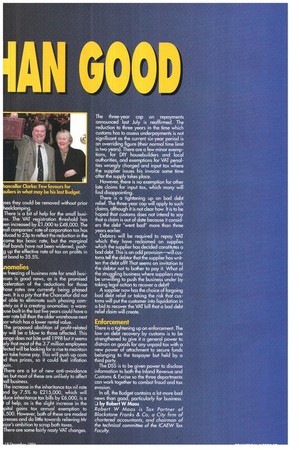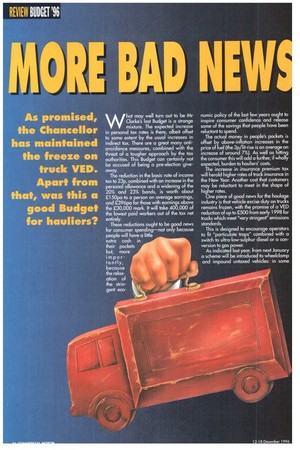AN GOOD
Page 43

Page 42

If you've noticed an error in this article please click here to report it so we can fix it.
hat may well turn out to be Mr Clarke's last Budget is a strange mixture. The expected increase in personal tax rates is there, albeit offset to some extent by the usual increases in indirect tax. There are a great many antiavoidance measures, combined with the threat of a tougher approach by the tax authorities. This Budget can certainly not be accused of being a pre-election giveaway.
The reduction in the basic rate of income tax to 23p, combined with an increase in the personal allowance and a widening of the 20% and 23% bands, is worth about El 50pa to a person on average earnings, and £396pa for those with earnings above the £30,000 mark. It will take 400,000 of the lowest paid workers out of the tax net entirely.
These reductions ought to be good news for consumer spending—not only because people will have a little extra cash in their pockets but, more importantly, because the relaxation of the stringent eco
nomic policy of the last few years ought to inspire consumer confidence and release some of the savings that people have been reluctant to spend. The actual money in people's pockets is offset by above-inflation increases in the price of fuel (the 3p/lit rise is on average an increase of around 7%). As well as [lifting the consumer this will add a further, if wholly expected, burden to hauliers' costs.
The increase in insurance premium tax will herald higher rates of truck insurance in the New Year. Another cost that customers may be reluctant to meet in the shape of higher rates. One piece of good news for the haulage industry is that vehicle excise duty on trucks remains frozen, with the promise of a VED reduction of up to £500 from early 1998 for trucks which meet "very stringent" emissions standards.
This is designed to encourage operators to fit "particulate traps" combined with a switch to ultra-low-sulphur diesel or a conversion to gas power. As indicated last year, from next January a scheme will be introduced to wheelclamp and impound untaxed vehicles: in some ses they could be removed without prior heelclamping. There is a bit of help for the small busiss. The VAT registration threshold has en increased by £1,000 to £48,000. The all companies' rate of corporation tax has clucecl to 23p to reflect the reduction in the come tax basic rate, but the marginal lief bands have not been widened, pushg up the effective rate of tax on profits in at band to 35.5%.
nomalies
e freezing of business rate for small busisses is good news, as is the promised celeration of the reductions for those ose rates are currently being phased . It is a pity that the Chancellor did not I able to eliminate such phasing corntely as it is creating anomalies: a wareuse built in the last five years could have a er rate bill than the older warehouse next • r which has a lower rental value.
The proposed abolition of profit-related y will be a blow to those affected. This ange does not bite until 1998 but it seems ely that most of the 3.7 million employees cted will be looking For a rise to maintain ir take home pay. This will push up costs d thus prices, so it could fuel inflation in.
There are a lot of new anti-avoidance les but most of these are unlikely to affect all business.
The increase in the inheritance tax nil rote ncl by 7.5% to £215,000, which will uce inheritance tax bills by £6,000, is a of help, as is the slight increase in the pital gains tax annual exemption to ,500. However, both of these are modest reases and do little towards relieving Mr jor's ambition to scrap both taxes. There are some fairly nasty VAT changes. The three-year cap on repayments announced last July is reaffirmed. The reduction to three years in the time which customs has to assess underpayments is not significant as the current six-year period is an overriding figure (their normal time limit is two years). There are a few minor exemptions, for DIY housebuilders and local authorities, and exemptions for VAT penalties wrongly charged and input tax where the supplier issues his invoice some time after the supply takes place. However, there is no exemption for other late claims for input tax, which many will find disappointing. There is a tightening up on bad debt relief. The three-year cap will apply to such claims, although it is not clear how. It is to be hoped that customs does not intend to say that a claim is out of date because it considers the debt "went bad" more than three years earlier.
Debtors will be required to repay VAT which they have reclaimed on supplies which the supplier has decided constitutes a bad debt. This is an odd provision—will customs tell the debtor that the supplier has written the debt off? That seems an invitation to the debtor not to bother to pay it. What of the struggling business where suppliers may be unwilling to push the business under by taking legal action to recover a debt? A supplier now has the choice of forgoing bad debt relief or taking the risk that customs will put the customer into liquidation in a bid to recover the VAT bill that a bad debit relief claim will create.
Enforcement
There is a tightening up on enforcement. The law on debt recovery by customs is to be strengthened to give it a general power to distrain on goods for any unpaid tax with a new power of attachment to secure funds belonging to the taxpayer but held by a third party. The DSS is to be given power to disclose information to both the Inland Revenue and Customs & Excise so the three departments can work together to combat fraud and tax evasion.
In all, the Budget contains a lot more bad news than good, particularly for business. :1 by Robert W Maas Robert W Maas is Tax Partner of Blackstone Franks & Co, a City firm of chartered accountants, and chairman of the technical committee of the ICAEW Tax Faculty.
















































































































